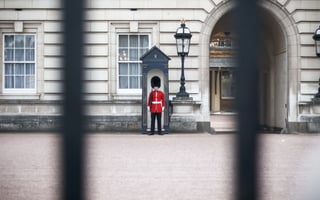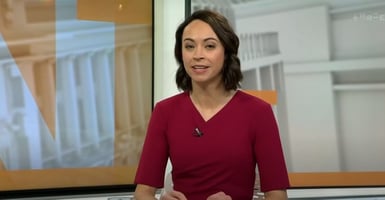There is some advice we give far more often than others during our media training courses.
“Golf, but louder”.
That’s how a new lucrative and controversial golf tournament has been billed.
LIV Golf has seen golf join other sports in embracing money from Saudi Arabia.
Amid a backdrop of ‘sportswashing’ allegations – using sport to improve reputation - the tournament got underway just outside London last week.
And one of the loudest things about it appears to have been the fallout and the disastrous way media questions were handled, creating some memorable ‘how not to do it’ media training case studies.
The controversial tournament, backed by PIF - the sovereign wealth fund of Saudi Arabia - has dominated the golf agenda in recent months.
And, to put those of you who don’t follow it into the picture, there is a split between those happy to take the Saudi cash and others remaining loyal to existing tournaments.
It is a divide that has deepened in the past few chaotic days with the PGA Tour suspending those who took part in this event – a move LIV Golf labelled as “vindictive”.
Official statement from LIV Golf pic.twitter.com/UBt4DpRdS4
— LIV Golf (@LIVGolfInv) June 9, 2022
Rory McIlroy - one of the big names shunning the new tour, made his feeling known last week.
"We all know why everyone's playing in London this week,” he said.
"It's boatloads of cash, and it's money upfront. I get it, and for some guys, that's really enticing."
And ahead of the players teeing off on Thursday, Amnesty International UK accused those taking part of being “willing stooges of Saudi sportswashing”.
So, surely the LIV Golf players would expect to face some difficult questions at the press conference ahead of the tournament and worked out how they could handle them?
Not from the evidence I have seen.
English golfers Ian Poulter and Lee Westwood provided a masterclass in how not to handle difficult questions when they were put on the spot by Neil McLeman, from the Mirror. Here is the exchange.
McLeman: “Lee and Ian, is there anywhere in the world you would not play? If Vladimir Putin put on a tournament, would you play there?”
Poulter: “That’s speculation. I’m not even going to comment on speculation.”
McLeman: “In a generality, is there anywhere you would not play on a moral basis? If the money was right, is there anywhere you would not play?”
Poulter: (long silence) “I don’t need to answer that question.”
McLeman: “Sorry?”
Poulter: “I don’t need to answer that question."
McLeman: “Lee, do you want to answer it? Would you have played in apartheid South Africa, for example?"
Westwood: “You are just asking us to answer a hypothetical question there, which we can't answer a question on that."
McLeman: “But they are moral questions, aren’t they?”
🗣️ "If Vladimir Putin had a tournament, would you play that?"
— Sky Sports Golf (@SkySportsGolf) June 8, 2022
Ian Poulter and Lee Westwood refuse to answer questions on whether there is anywhere in the world they wouldn't play. pic.twitter.com/v9WkEYvDoy
The fact they knew not to get drawn into speculative questions suggests an element of media training. But it could not have been good media training because this was excruciating stuff. Some might say embarrassing.
Not only are the questions badly answered, but the body language and haunted look on their faces in the clips shared on social media and newspaper websites suggest they had not anticipated tough questions.
Athletes and sporting events are packed with advisers. LIV Golf hired former White House press secretary Ari Fleischer.
So, surely there was a briefing ahead of the press conference on what questions might be asked and how to handle them?
Not having one would be the same as an organisation sending a spokesperson into media interviews without any briefing. The golfers may be individual athletes, but they also represent this shiny new tournament.
Let’s say there wasn’t a briefing - which would seem like a massive oversite from the players and tournament organisers. Poulter and Westwood would have had an idea of what was to come from the questions others, such as Graeme McDowell, had faced.
His ‘we’re golfers, not politicians’ response to the issue was hardly ideal. But it was not as damaging as refusing to answer these questions.
Yes, the questions were tough, and they were hypothetical.
But journalists ask speculative questions, and anyone who faces the media, regardless of whether they are a sports star, should expect to answer them. Preparation is vital, as we so often say in these media training blogs.
By acting so defensively and refusing to answer the questions, Poulter and Westwood have refused to rule out playing in a tournament organised by Putin.
That is not a position that will dispel the notion they would play wherever they think the money is right.
And it leaves them in a reputational bunker it may be tricky to escape.
But they are not alone among those involved with LIV Golf in making a mess of media appearances.
Phil Mickelson, who is playing in the breakaway tournament, apologised a few months ago after saying that the backers of the new competition are “scary m*****f******”.
He claimed those comments were off-the-record and “taken out of context” - there is a whole different media training lesson we could look at on that alone.
Back to last week’s press conference action, and the reporter who asked Graeme McDowell about his thoughts on LIV Golf doing PR for the Saudi government given its human rights record, was escorted from a subsequent press conference. Golfer Kevin Na could be heard saying, “this is awkward”.
"This is uncomfortable" 😬
— Sky Sports Golf (@SkySportsGolf) June 7, 2022
Kevin Na had an awkward end to his LIV press conference as a journalist tried to ask a question about deferred payments from the PGA Tour and whether resigning membership would allow players to hold onto them. pic.twitter.com/XdxmHLmwCG
And, over the weekend, another journalist was removed from Phil Mickelson’s post-round press conference.
Well, a couple of neckless security dudes just physically removed me from Phil Mickelson's press conference, saying they were acting on orders from their boss, whom they refused to name. (Greg Norman? MBS? Al Capone?) Never a dull moment up in here.
— Alan Shipnuck (@AlanShipnuck) June 9, 2022
Even Yasir Al-Rumayyan, the PIF director – and chairman of Newcastle United – struggled. Doorstepped by BBC journalist Dan Roan as he arrived at the course, the wealth fund supremo happily explained why he was on site, before responding to a question about sportswashing by saying he was “not sure about this terminology” and walking away.
Exclusive: just had brief word with
— Dan Roan (@danroan) June 8, 2022
Yasir Al-Rumayyan, the elusive Newcastle Utd chairman &
supremo of Saudi sovereign wealth fund PIF - which is funding highly controversial LIV golf series which starts here at Centurion Club tmrw. Asked him about claims of sportswashing pic.twitter.com/yKCoaMaa9f
All this from just one event.
Golf, but louder? Maybe.
But not necessarily for the right reasons.
And those involved have struggled to convince that money doesn’t speak louder than morals.
Media First are media and communications training specialists with over 35 years of experience. We have a team of trainers, each with decades of experience working as journalists, presenters, communications coaches and media trainers.
Subscribe here to be among the first to receive our blog.




